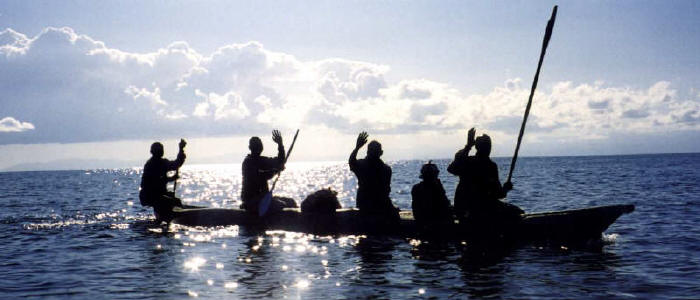

Friday, June 14 and Saturday, June 15
Nkhata Bay, Malawi: Njaya Lodge
We get up early to catch the 8:00 bus to Mzuzu where we'll transfer to a mini-bus to Nkhata Bay, a resort town on Lake Malawi, said to have a Caribbean feel to it. We stand by the side of the road waiting, and around 8:15, we see a mini-bus headed our way. We attempt to flag it down (the African method of hitchhiking is to hold your arm in front at shoulder level and wave it up and down), but the mini-bus drives right by us, without even slowing down. This is the first time we've seen any transport considered "too full" for more passengers, The next bus is not supposed to come for a few hours, so we decide to try to hitch a ride. We finally get picked up by Coke bottle delivery truck and sit in the back surrounded by cases of soda and beer bottles. This little trip -- about a half-hour -- was one of Randy's top ten highlights of the whole trip. The truck took us to Chiweta where we were able to get a bus to Mzuzu. While waiting in Chiweta, the Coke truck driver bought us the coldest Cokes we'd have the whole trip, which, being entirely out of kwacha, was a real treat.
After a short wait, the bus arrived in Chiweta, and we piled on. I managed to get a seat and Randy stood for a while. Eventually he found one across the aisle and spent the next six or seven hours chatting with a very pleasant Zambian businessman named Bill. (Bill opened his briefcase to get something and I noticed that he was carrying an odd combination of books: the Bible, and Men are from Mars, Woman are from Venus.) The trip was long and slow, stopping at every little village along the way, and also a little smelly as a result of the fish that passengers had hung in the windows to dry. We arrived at Mzuzu bus station late in the day, with just enough time to change money before trying to figure out how to get to Nkhata Bay. Mzuzu bus station is, in a word, a nightmare. Mini-vans pulled in, filled up (in the African filling up style), and then backed out the same way they'd come in, making for some interesting traffic patterns. Eventually we found the mini-van to Nkhata Bay by following the only other white guy that we saw. That guy, a Norwegian named Steig, happened to be heading to the same lodge that we were and became our new traveling companion. Nkhata Bay was just another hour away, and we were very ready to get there.
We had our hearts set on spending a few days at Njaya Lodge (described in the Lonely Planet as "legendary on the backpacker's circuit"), and found when we got into town that there was no way to get there other than walking. Tired after a full day of travel, we did the 20-minute uphill walk with full packs only to find out that it was full. Thank God for the tent. We set it up on the lawn, had an excellent dinner, showers (cold, but refreshing), and cold beer. We were starting to feel human again. Sitting at the bar after dinner we met up with our Canadian friends, Paul, Nicole, and Priscilla, who we'd first met on the bus ride down from Tanzania. Paul and Nicole had made plans to do a four day kayaking trip on the lake with a local company called Monkey Business; we decided to join them and ended up dragging Steig along as well.
Nkhata Bay has suffered quite a bit after 9/11. Apparently, there was talk a few months earlier that the whole town might go under. While there were still a good number of tourists in town, the only money exchange in town has closed up, and unbelievably the closest internet cafe was an hour's bus ride away in Mzuzu.
Forms of Transportation: Coke truck, bus, mini-bus, walking

A view of Nkhata Bay on the walk into town from Njaya Lodge
When we got up the next day, we could finally got a view of the lake. The lake, at 365 miles long and 52 miles across, is the third largest in Africa, and covers one-fifth of Malawi's territory. The lake, though, is surprisingly unspoiled, largely because there are very few motorized boats on the lake. The main form of transportation, which is used extensively, is the dugout canoe. There are a couple of large ferries that run both up and down, and across the lake on a weekly schedule, as well as some very dodgy looking taxi boats that run up and down the shore on a daily basis.
We spent most of that day lounging around on the deck at Njaya, and waiting to move into a bungalow. The wait was well worth it. Our bungalow was right on the lake -- literally -- our porch sat on top of the lake, and at night we could hear the water lake gently lapping under the bungalow all night.
Highlight of the day: BBQ night at Njaya